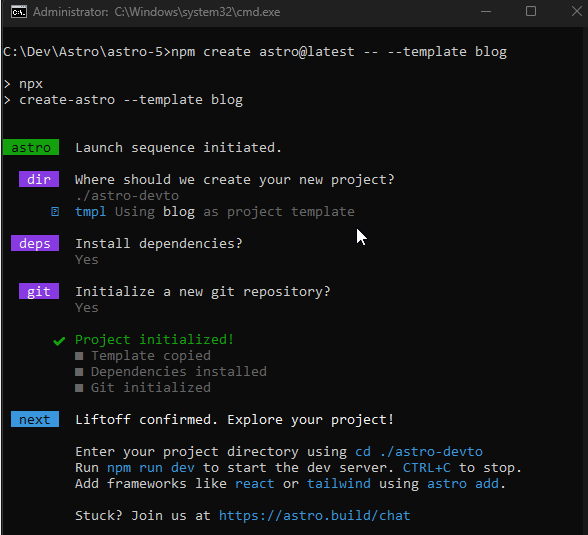Home >Web Front-end >JS Tutorial >AstroJS: Integrate Dev.to content easily
AstroJS: Integrate Dev.to content easily
- Barbara StreisandOriginal
- 2024-12-29 00:02:10966browse
Start a new project with the blog template
npm create astro@latest -- --template blog

We launch the app
cd [project_name] && npm run dev


Starting with Astro 5, the Content Layer API has been introduced, a tool that allows you to load data from any source during the construction of your site and access it through a simple, securely typed API.
This API offers flexibility to handle content from various sources, such as local Markdown files, remote APIs, or content management systems (CMS). By defining “collections” of content with specific schemas, you can structure and validate your data efficiently. Additionally, the Content Layer API improves performance on content-heavy sites, speeding up build times and reducing memory usage.
https://astro.build/blog/astro-5/
Astro's Content Layer API to integrate dev.to posts into your site
You can use Astro's Content Layer API to integrate dev.to posts into your site. Although there is no specific loader for dev.to, you can create a custom one that consumes its API and stores posts in a content collection in Astro.
To achieve this, follow these steps:
1. Configure access to the dev.to API



Create the .env file in the root of the project
.env
DEV_TO_API_URL=https://dev.to/api/ DEV_API_KEY=tu_clave_de_api
2. Define a collection in Astro
In src/content.config.ts, define a collection for dev.to posts using the Content Layer API:
When creating the project with the Astro template, it automatically generates the collection for the Blog
srccontent.config.ts
import { glob } from 'astro/loaders';
import { defineCollection, z } from 'astro:content';
const blog = defineCollection({
// Load Markdown and MDX files in the `src/content/blog/` directory.
loader: glob({ base: './src/content/blog', pattern: '**/*.{md,mdx}' }),
// Type-check frontmatter using a schema
schema: z.object({
title: z.string(),
description: z.string(),
// Transform string to Date object
pubDate: z.coerce.date(),
updatedDate: z.coerce.date().optional(),
heroImage: z.string().optional(),
}),
});
export const collections = { blog };
Now we create the collection for the Dev.to articles
const devTo = defineCollection({
loader: async () => {
const headers = new Headers({
"api-key": DEV_API_KEY,
});
const posts = await fetch(`${DEV_TO_API_URL}articles?username=jmr85`, {
headers: headers
}).then(res => res.json());
return posts.map((post: any) => ({
id: post.slug,
title: post.title,
description: post.description,
pubDate: new Date(post.published_at),
updatedDate: post.edited_at ? new Date(post.edited_at) : null,
heroImage: post.cover_image || post.social_image,
url: post.url,
}));
},
schema: z.object({
title: z.string(),
description: z.string(),
pubDate: z.coerce.date(),
updatedDate: z.coerce.date().optional(),
heroImage: z.string().nullable(),
url: z.string(),
}),
});
export const collections = { blog, devTo };
This is the complete code for
srccontent.config.ts
DEV_TO_API_URL=https://dev.to/api/ DEV_API_KEY=tu_clave_de_api
Look at the detail in the definition of the fields in schema, the fields have to match the blog collection of the Astro template and then add those that are particular to the collection of Dev.to posts. They have to have the same name as the data type, this is so that we can "merge" the markdown posts from the Astro template with those from Dev.to in the Blog section.
3. Use posts on your pages:
You can now access dev.to posts in your Astro components or pages using getCollection:
Originally:
srcpagesblogindex.astro
import { glob } from 'astro/loaders';
import { defineCollection, z } from 'astro:content';
const blog = defineCollection({
// Load Markdown and MDX files in the `src/content/blog/` directory.
loader: glob({ base: './src/content/blog', pattern: '**/*.{md,mdx}' }),
// Type-check frontmatter using a schema
schema: z.object({
title: z.string(),
description: z.string(),
// Transform string to Date object
pubDate: z.coerce.date(),
updatedDate: z.coerce.date().optional(),
heroImage: z.string().optional(),
}),
});
export const collections = { blog };
Now we will do the iteration of the posts with an inline conditional that, if it is devto, will redirect to the url of the article on the site https://dev.to/{username}/{slug-article}
{
posts.map((post) => (
<li>
<a href={post.collection === "devTo" ? post.data.url : `/blog/${post.id}/`}>
<img width={720} height={360} src={post.data.heroImage} alt="" />
<h4>
<p><img src="/static/imghwm/default1.png" data-src="https://img.php.cn/upload/article/000/000/000/173540174627117.jpg" class="lazy" alt="AstroJS : Integra contenido de Dev.to de manera sencilla"></p>
<p>Repository: https://github.com/jmr85/astro-devto</p>
The above is the detailed content of AstroJS: Integrate Dev.to content easily. For more information, please follow other related articles on the PHP Chinese website!
Related articles
See more- An in-depth analysis of the Bootstrap list group component
- Detailed explanation of JavaScript function currying
- Complete example of JS password generation and strength detection (with demo source code download)
- Angularjs integrates WeChat UI (weui)
- How to quickly switch between Traditional Chinese and Simplified Chinese with JavaScript and the trick for websites to support switching between Simplified and Traditional Chinese_javascript skills

